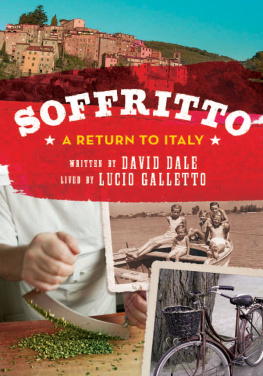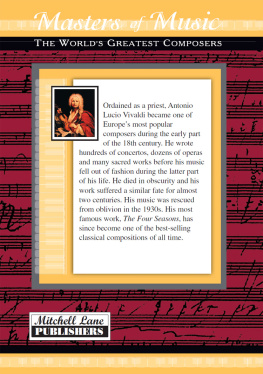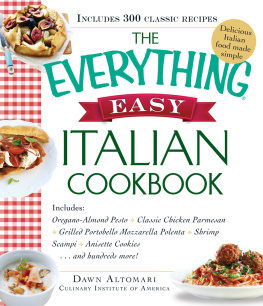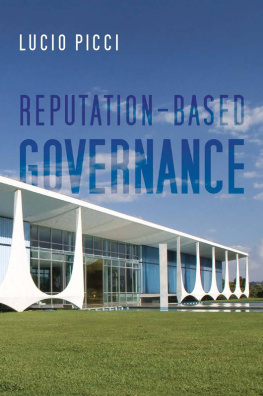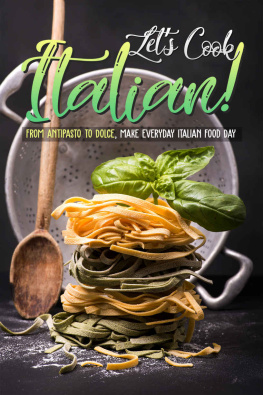and social change for newspapers, magazines, radio programs and websites. He has been a political reporter for The Australian , breakfast broadcaster for the ABC and editor of The Bulletin . His books include Lucios Ligurian Kitchen , The Little Book of Australia and The Perfect Journey . Google david dale and the tribal mind for more.
LUCIO GALLETTO was born into a family of farmers and restaurateurs in Liguria, north-west Italy. He was studying to become an architect when he fell in love with a visiting Australian and moved to Sydney, where he founded one of Australias most awarded Italian restaurants. In 2008 he received the OAM for services to hospitality and the arts.
This edition published in 2011
First published in 2007
Copyright David Dale and Lucio Galletto 2007, 2011
All rights reserved. No part of this book may be reproduced or transmitted in any form or by any means, electronic or mechanical, including photocopying, recording or by any information storage and retrieval system, without prior permission in writing from the publisher. The Australian Copyright Act 1968 (the Act) allows a maximum of one chapter or 10% of this book, whichever is the greater, to be photocopied by any educational institution for its educational purposes provided that the educational institution (or body that administers it) has given a remuneration notice to Copyright Agency Limited (CAL) under the Act.
Allen & Unwin Sydney, Melbourne, Auckland, London
83 Alexander Street
Crows Nest NSW 2065
Australia
Phone: (61 2) 8425 0100
Fax: (61 2) 9906 2218
Email: info@allenandunwin.com
Web: www.allenandunwin.com
Cataloguing-in-Publication details are available from the National Library of Australia www.trove.nla.gov.au
ISBN 978 1 74237 488 8
Map on p. viii by Luke Sciberras Internal design by Emily ONeill
Set in 11/14 pt Adobe Garamond Pro by Bookhouse, Australia
eBook production by Midland Typesetters, Australia
Printed in Australia by McPhersons Printing Group
10 9 8 7 6 5 4 3 2 1
We shall not cease from exploration
And the end of all our exploring
Will be to arrive where we started
And know the place for the first time.
T.S. ELIOT Little Gidding (the last of his Four Quartets )


There are a lot of books in here. It began as a psychological investigation and ended up a love story, travel memoir, war adventure, eating guide and portrait of modern Europe.
I was curious about some key questions of our age: How did the Italians conquer the English-speaking world without firing a single shot? How did their food, their art and their attitude become so influential on twenty-first-century life? Does Italy hold the secret of human happiness?
Id been a visitor at Lucios restaurant for years before we started discussing these sorts of issues. He wasnt even sure they were the right questions, but thought his cousin Mario would have something to say on the subject. The next time I was travelling in Italy, I went to see Mario in the seaside town of Bocca di Magra. And there I discovered the restaurant called Capannina Ciccio, the area called Lunigiana and the tale of two families.
Mario, like Lucio, was a reluctant restaurateur. Young Mario intended to make movies. Young Lucio intended to design buildings. Fate intervened while they were making other plans. And it turned out that something in their upbringing had equipped them perfectly to become successful hosts at opposite ends of the planet, and to realise, much later in their lives, that this was what they were meant to do.
When I got back to Sydney, I found that my urge to explore the questions about Italy coincided with an urge in Lucio to understand his origins to bring to his conscious mind the concepts and skills his younger self had absorbed unconsciously. Lucio put his self-analytical mood down to a midlife crisis, but I suspected it came from a realisation that his children were on the verge of adulthood, examining their own career options after growing up in a totally different environment from their father. He was wondering what he could pass on to them that might help make their lives as enjoyable as his had been.
So Lucio and I decided to go back to Lunigiana in search of his soffritto the local word for the base of a sauce, the ingredients that give a dish its identity: oil, garlic, herbs, celery, family, locality, tradition...
This wasnt the first time Lucio had returned home in the 26 years since he ran away for love. Hed made brief visits so his children could get to know their grandparents. But during those trips hed paid no attention to his surroundings.
This was his first opportunity to examine his territory with the eyes of a stranger, talking to the farmers, cooks, artisans, fishermen, winemakers, shepherds, waiters and scholars who produce the fundamentals of the Italian food repertoire parmesan, olive oil, pasta, prosciutto, balsamic vinegar, truffles, pesto and much more.
It was the first time Lucio had spoken to family members about how his aunt and uncle eloped to make ice-cream, how his father fought the Fascists, how four friends built a shack on a beach and how his cousins saved the restaurant when his uncle died. And it was his first chance to meet a new generation of young Italians who are seeking authenticity in peasant traditions which embarrassed their parents.
Of course, one visit was not enough. There were too many people to see, and too many meals to eat. With photographer Paul Green, we ended up travelling through the north-west of Italy four years in a row in spring, in autumn and twice in summer. At the end of this story, I have given details of the eating places we visited, so you can repeat our journeys, and Lucio has created recipes for most of the dishes we tried, so you can share our experiences.
Lucio came back to Australia a rebuilt man. You may judge whether we answered the bigger questions.
David Dale
A note on language
You dont need to speak Italian to understand this book, but a few clues on pronunciation might help the flow of reading. The key names are pronounced Looch-oh, Cheech-oh and Loo-nidj-ah-nah.
In Italian, any time the letter c is followed by i or e , it is pronounced like the ch in church. The rest of the time it is pronounced like the k in cake zukini, kianti, rah-deek-ee-oh, and so on. So the beef dish carpaccio is kar-pah-chee-oh and the fish soup cacciucco is ka-choo-koh.
Same principle with the letter g soft as in sage before i or e , hard as in got before other vowels and before h . Thus Via Francigena, the pilgrim trail from France to Rome, is pronounced Fran-chidj-enuh and cinghiale , wild boar, is chin-ghee-ah-leh. But when g is followed by l , it is not pronounced at all so tagliatelle is tal-ya-tel-eh and grigliata is greel-yata
Potessio sostenerti nella mano, terra di luni, come un vaso etrusco!
If only I could hold you in my hand, land of Luni, like an Etruscan vase!

